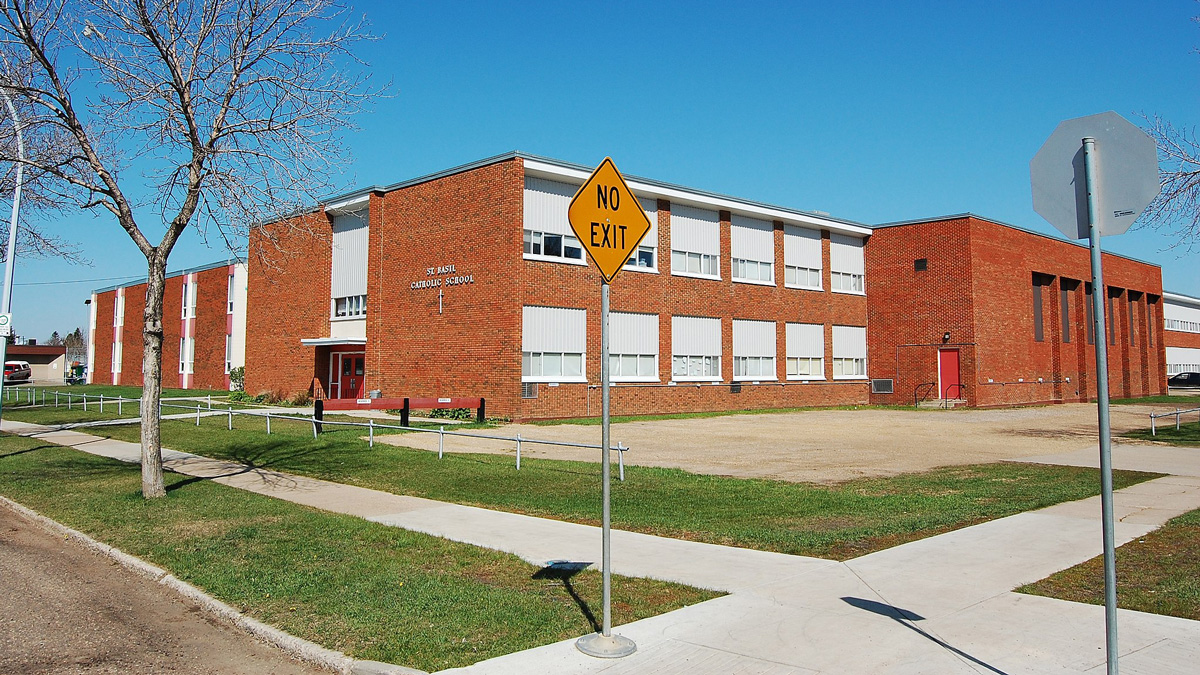 Jessica Tang
Jessica TangMorrigan Simpson-Marran, a fifth-year economics student, grew up in Calgary, a city built on the oil and gas industry. “I didn’t actually really have an opinion on oil and gas [before university],” she says. “I knew roughly that if you burn fossil fuels you get emissions, and I knew we somehow put oil into our cars, but I had very little understanding of all that.”
In 2016, Simpson-Marran spent the summer interning at Whitehead Oil Company, and that’s when her knowledge and feelings about oil grew. Through all her research for the company, she says she realized how much more we could all be doing — on a personal, provincial, and federal level — to reduce our carbon footprints. Since then, she has become involved with the University of Alberta’s Centre for Applied Business Research in Energy and the Environment and spent time interning at an energy think tank. She’s also doing a certificate in environmental and resource management.
Simpson-Marran can see the argument around oil from both sides. On the one hand, there are people who are concerned about the rapid rate of climate change; about findings in the newest report from the Intergovernmental Panel on Climate Change that say if we minimize warming to the two degree mark, we’ll “only” lose the Persian Gulf, cause the extinction the world’s tropical reefs, and see over four meters of sea level rise. If we reach three degrees of warming, we can expect the flooding of most coastal cities and forests in the arctic. Four degrees is predicted to bring desert across large sections of India, Bangladesh, and China, make the American Southwest inhabitable, and cause permanent drought in large areas of Europe. The odds of reaching the Paris Agreement goals and keeping warming below 2C are now one in 20.
It’s completely understandable that people want to avoid this level of global catastrophe. Many Albertans are scared about our contribution to the global rising temperatures, seeing it as not only something we should address and try to mitigate, but as our duty to do so.
But Albertan identity seems inextricably linked to oil. So many jobs and so much prosperity has come from this industry. Even Edmonton’s hockey team is named after it.
“If you think about it, your job is intrinsically a part of who you are, it’s what you’ve dedicated your life to doing, so it makes sense that there’s a given loyalty to this product,” Simpson-Marran says.
This is something I’ve felt and seen with my own family. My grandpa was a fisherman in Nova Scotia looking for a job to support his family, and he found it in the oil industry in Alberta. He was one of the smartest people I knew; however, after starting work on the ships at the age of 16, he had minimal opportunities for higher education. Later, when I was telling my family about my engineering classes, my grandpa said he never thought anyone in his family would be able to study engineering. It was his hard work, his labour, that gave my mom and her sisters the opportunity to go to university, and paved the way for me to have the opportunities I’ve had.
In a 2018 survey, only 54 per cent of Albertans said they believe climate change is caused by humans and industrial activity, compared to 70 per cent across Canada as a whole. The rest of Albertans see it as a result of natural patterns in the Earth’s environment.
It is this very divide that makes both environmental and economic catastrophe at much higher risk of becoming a reality. Activists that deny climate change and try to stop climate action have been, and likely will continue to be, effective at slowing down very necessary steps forward. Many of those who dismiss and devalue the serious and scientifically-backed reality of climate change are those who worry most about the economic devastation that could emerge from the collapse of the industry. On the other end of the spectrum, I’ve heard many environmentalists deny our economic reliance on fossil fuels and the large impact losing that industry would have on our quality of life. This denial could lead to the economic and social burden being put disproportionately onto workers and towns that are dependent on this industry.
How do we in Alberta address both of these catastrophes, maintain a dialogue, and make sure we distribute the burdens we are facing in a fair way? In such a strongly divided issue, the solution often lies in the grey — not through inaction and the dismissal of both issues, but rather genuine accounting for the concerns of each party.
Oil is a key part of the settler history of our province. Hereward Longley, a U of A PhD candidate specializing in the history of oil in Alberta, says the province formed, grew, and developed alongside the oil industry.
Just nine years after Alberta became a province in 1905, natural gas was discovered in Turner Valley, outside Calgary. Overnight, 500 oil companies were formed and drilling began, bringing people to the province in droves and providing an economic alternative to the hardships of homesteading in Alberta.
The industry in Turner Valley fluctuated throughout the first half of the 1900s, but during that time, Imperial Oil was searching for alternatives. On February 13, 1947, everything changed: oil was struck in Leduc. This led to further discoveries, and soon investments were flooding in, along with immigrants looking for work. Calgary and Edmonton emerged as major cities and Alberta went from an agricultural province to one full of new opportunities.
“I think once people understand that this [transition] is necessary and that we’re all in this together and that it’s going to be fair, then they’re more likely to accept it and more likely to support it.”
And then there are the oil sands. Humans had known about this resource forever — the Cree used the tar to waterproof their canoes, and explorers wrote about the heavy oil they would see floating on the rivers. But the oil sands weren’t exploited until the 1960s, when the technology to extract the oil had finally been developed. This caused the industry to massively expand, bringing people to the province and causing population booms in Calgary and Edmonton, as well as the development of many small towns and cities around oil sands mining operations.
“It’s become this incredible cornerstone of the economy that’s completely transformed the number of people who live here and the way the political makeup of the province is formed,” Longley says.
Many Albertans became dependent on the oil industry for employment. But it also resulted in huge environmental change in Northern Alberta. Many Indigenous and Métis communities were left out of the prosperity, and suffered the most environmental consequences. “[Oil is] this complicated thing with all these impacts on the environment and Indigenous communities — that all stems back to the beginning of the industry,” Longley says.
Alberta wouldn’t be the province it is today without the jobs and opportunities that have come from oil. A job in oil and gas is by no means the only way a person can support themselves and their family, but many Albertans relate to this narrative. This is often painted as the economic argument for oil, but what is the economic reality of oil in Alberta? Simpson-Marran says it’s much more tenuous than we think. In Alberta, you often hear people say we have the best oil in the world, but that’s just not true from a chemical perspective.
The oil sands produce the most expensive oil with the highest emissions in the world. The bitumen can’t just be pumped from the ground like conventional oil — it has to be “mined,” requiring additional upgrading and refining, making the process more expensive. When we do get the oil out of the ground, it then has to be pulled from sludgy sand. On top of that, the oil we extract isn’t high quality. It has high sulfur content, and for many applications that sulfur needs to be removed and properly disposed of — an expensive process that raises the price of producing our oil even more.
Being at the bottom of the barrel has its consequences. It’s hard for us to be competitive in the international market unless the price of oil is high and regulations are minimal. With anxiety around climate change and air pollution rising, there’s a global push to diversify energy resources away from traditional fossil fuels.
There are other global problems making the future of Albertan oil uncertain. The US is our biggest export partner — in 2015, 97 per cent of our oil went to them — but they became a net exporter of oil in 2018. “If you’re cutting off your biggest market at the knees cause they’re able to supply their own needs, you’ve got a problem,” Simpson-Marran says.
And when we talk about issues like the Trans Mountain pipeline expansion, the argument is often made that we need to get Albertan oil to other markets besides the U.S. “[But] the thing that I find interesting about that is no one took the time to see if other markets want our oil,” Simpson-Marran says. “To put it in economic terms, our oil is not a perfect substitute for every other oil in the world. It sells at a discount, it’s a crappy oil.” For example, she can’t find any public data to show that China has any capability to handle our oil.
Another cause for concern is the International Marine Organization’s new sulfur regulation that will take effect in 2020, requiring oil producers to reduce their sulfur content from 3.5 per cent to 0.5 per cent. This means more of Canada’s exported oil will have to be processed to a higher degree, making it more expensive to produce and meaning over a third of the production of the Athabasca oil sands, the largest oil sands development in Alberta, unprofitable.
“In terms of the pragmatic view, when you present the fact that our oil is expensive to produce and can’t get as high of a price, when you put it in dollar terms, I think that’s when a lot of people start to realize that this is a more nuanced issue than what we’re presented with by mainstream media and politicians,” Simpson-Marran says.
It seems as though there are two emerging truths: first, that we won’t be able to produce oil like we have in the past for much longer; and second, that a transition away from oil is a reality that we will have to face. While about half of Albertans deny the role humans play in climate change, that kind of disregard for science shouldn’t be validated. How do we have a discussion based on these realities, and help those who will be most affected by this likely transition, while still making the shifts that need to be made to address climate change?
The idea of fairness seems to be at the root of our province’s polarization. Laurie Adkin, a political science professor who studies climate change policy, says much of the worry around moving away from oil is about how the costs of that divestment will be distributed fairly.
For a long time, Canada has profited from Alberta’s energy wealth and resources. But it can’t reach emission reduction targets without cuts from Alberta, which accounts for 30 per cent of Canada’s emissions despite having a population of only 4.3 million. This is 10 per cent higher than emissions from Ontario, which has over triple the population. Because of this disparity, there needs to be federal support in having these conversations and setting goals to reach these targets.
Adkin says we need to map out how to get to net zero carbon by 2050, and do so without putting extraordinary costs on any one part of the population.
“My argument up until now has been that Alberta can’t just be expected to make this transition without a sharing of the cost throughout the country,” she says. “There needs to be some form of transfer of resources and income to Alberta to help Alberta make this transition, which is a transition in the interest of the whole country.”
Adkin has been following climate policy since the 1990s, and has often heard the argument that, as an energy-producing country that wants to be competitive, Canada shouldn’t have ambitious targets. Because of this logic, she says, Canada hasn’t been doing its fair share. “Everyone thinks somebody else is going to do the hard part so nobody does anything and we end up with the situation we’re in now where the world is not meeting the targets that are necessary,” she says.
“If we’re going to be using this resource, how are we making sure that it’s actually fuelling the future?”
When it comes to climate change, energy, and adaptation, it’s important for the government to take a leadership role and engage with citizens in a meaningful way, Adkin adds. Instead of having experts tell the public what to do, a bottom-up discussion needs to be had that includes all people in Alberta.
But politically, this sort of discussion isn’t happening. Jason Kenney, the leader of Alberta’s United Conservative Party, is running his provincial election campaign on a central goal of dismantling the carbon tax, one of the most effective tools that Alberta has implemented to combat both environmental and economic catastrophe. He’s promising to bring jobs back to the fossil fuel industry, when in truth, the government has little control over the global reality of this issue.
Conversely, the province’s NDP has an extensive set of climate and economic diversification goals called the Climate Leadership Plan. But recently, they’ve fallen back on some of their commitments, delaying their cap on oil sands emissions and rolling back taxes on heavy emitters. Presumably, they felt they had to make these changes because of the backlash they received from Albertans and industry stakeholders. This may have been avoided if there had been more public consultation before implementing these policies.
“I think once people understand that this [transition] is necessary and that we’re all in this together and that it’s going to be fair, then they’re more likely to accept it and more likely to support it,” Adkin says.
What would it look like to make that transition?
Tim Weiss, who splits his time as a researcher and professor between the faculties of business and engineering, says Alberta can diversify its energy systems and still be a leader in the industry, given our wealth of technical expertise and renewable resources, as well as our already energy-literate population.
“If you put all those things together, I think we’re pretty well-positioned to be thinking about diversifying for the future,” he says. “I don’t think it’s going to happen by accident, and if we don’t make that deliberate choice I don’t think it’s a given that it does happen. But I do think we’re well-positioned to see that future coming and to be ready for it.”
Weiss stresses that even with the most aggressive decarbonisation strategies, we wouldn’t be phasing out fossil fuels overnight; there’s a window of opportunity to benefit from oil and gas as we transition away from it. But if we’re still going to be developing the oil sands, he says, it needs to be done in the most cost-effective and environmentally friendly way possible, and profits from the oils sands need to be invested into diversifying the province’s energy system. If we are going to mine fossil fuels somewhere in the world, Weiss says he’d like to see that happen in a jurisdiction that is taking that money and investing it into renewables or other technologies.
“If we’re going to be using this resource,” he says. “How are we making sure that it’s actually fuelling the future?”
Alberta’s identity is defined by oil. This mentality and history often leaves Albertans, myself included, feeling a strange sort of guilt when critiquing the industry. How do we turn our back on the things that brought us to this point? How do we appreciate what we have while still acknowledging the realities of climate change? How do we handle the fear that this industry may not be able to do for us what it did for our parents and grandparents?
The only way to combat both economic and environmental catastrophe is to open up an honest, fact-driven, and forward-thinking conversation about the industry within our province. When starting to have this conversation, it’s important to understand where Alberta fits within the global energy market. Where we stand in the market is shaped by the kind of oil that we produce.
“[Oil] is part of who we are and that’s irrefutable,” Simpson-Marran says. “It’s been making money for a long time and I think we’ve really developed this ‘We’re the hardworking Albertans’ mentality, and that’s not necessarily a bad thing… [But I] think blindly supporting anything without knowing the facts is risk-inducing.”




